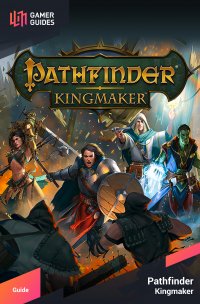The most common sort of danger you’ll encounter during your adventures will be the physical attacks of enemies - a broad spectrum of hazards that are united by their ability to be dodged, deflected or otherwise mitigated by checking your Armor Class. For other threats against which Armor Class is not an effective mitigating factor, you have Saving Throws.
There are three types of Saving Throws: Fortitude, Reflex, and Will, which reflect your character’s ability to endure, evade or resist a variety of different effects.
Your Saving Throws are largely dependent on what class(es) you pick as you level up, as the training regimens each class represents imparts a variety of bonuses on characters. Warriors are usually more physically hardy, rogues are more deft and spellcasters tend to have great mental acuity. That said, there are only two different class-based rates of Saving Throw progression, as listed on the tables below.
| Level | High Saving Throw Progression | Low Saving Throw Progression |
|---|---|---|
| 1 | +2 | +0 |
| 2 | +3 | +0 |
| 3 | +3 | +1 |
| 4 | +4 | +1 |
| 5 | +4 | +1 |
| 6 | +5 | +2 |
| 7 | +5 | +2 |
| 8 | +6 | +2 |
| 9 | +6 | +3 |
| 10 | +7 | +3 |
| 11 | +7 | +3 |
| 12 | +8 | +4 |
| 13 | +8 | +4 |
| 14 | +9 | +4 |
| 15 | +9 | +5 |
| 16 | +10 | +5 |
| 17 | +10 | +5 |
| 18 | +11 | +6 |
| 19 | +11 | +6 |
| 20 | +12 | +6 |
Saving Throw Progression by Class¶
| Class | Fortitude | Reflex | Will |
|---|---|---|---|
| Alchemist | High | High | Low |
| Barbarian | High | Low | Low |
| Bard | Low | High | High |
| Cleric | High | Low | High |
| Druid | High | Low | High |
| Fighter | High | Low | Low |
| Inquisitor | High | Low | High |
| Magus | High | Low | High |
| Monk | High | High | Low |
| Paladin | High | Low | High |
| Ranger | High | High | Low |
| Rogue | Low | High | Low |
| Sorcerer | Low | Low | High |
| Wizard | Low | Low | High |
In addition to your class, your race, Ability Scores and feats may also improve your Saving Throws.
Fortitude Save¶
A measure of your grit, health and endurance, characters with high Fortitude Saves are more likely to resist diseases, poisons, fatigue and death effects. The grueling training warriors endure generally bestows them with physiques less prone to duress than other classes. In addition to your class bonus, your Constitution Modifier also influences (positively or negatively) your Fortitude Save. Undead use their Charisma Modifier to determine their Fortitude Save instead of their Constitution. The Great Fortitude feat will also bolster your Fortitude Save.
Reflex Save¶
Armor is poor defense against fireballs, lightning bolts and ice storms. Against threats like this, your only option is to get out of the way the best you can, and none are better at this than agile characters like Rogues. Naturally you’ll add or subtract your Dexterity Modifier to your Reflex Save, and the Lightning Reflexes feat can also be picked to further supplement your Reflex Save.
Succeeding at a Reflex Save typically halves the damage your take from sources that allow a Reflex Save, but some classes (like the Rogue and Ranger) gain the Evasion and possibly Improved Evasion. With Evasion, if you succeed at a Reflex Save to halve the damage you’d take from an attack, you’ll now take no damage. With Improved Evasion, you’ll still take no damage from a successful save, but only half damage even should you fail your Reflex Save. All in all, it makes these characters rather difficult to blast with offensive magics.
Will Save¶
Just as a warrior’s physical training leaves them with a body resilient to to the rigors of adventuring, a spellcaster’s training has likewise benefited their mental fortitude. Characters with a high Will Save are more likely to see through illusions and resist the effects of mind-affecting effects, presumably due to their own training and familiarity with such magics. A character’s Wisdom Modifier is also added to (or subtracted from) their Will Save, and the Iron Will feat will further bolster their resilience.

 Sign up
Sign up
No Comments